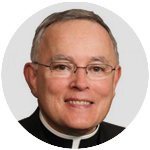
Archbishop Charles Chaput, O.F.M. Cap.
Archbishop Charles J. Chaput, O.F.M. Cap.
Religious Freedom Institute
Washington, D.C.
November 9, 2019
***
The following speech was delivered by John McGarvey, president of The Catholic University of America, in Archbishop Chaput’s absence.
***
I turned 75 in September. If you make it to my age, you know yourself and your limitations pretty well. So I have no illusions that I actually earned tonight’s award. But I’m very grateful to accept it, because it gives me a chance to be with you in supporting the Religious Freedom Institute. Tom, Eric, Tim, Kent, and the whole RFI team do profoundly important work. I’ve admired them for many years. So it’s a privilege to call them friends, and to encourage all of us to help them in every way we can.
George has already given us a wonderful talk. We don’t need another, so I’ll be brief. But as I was getting ready for tonight, I remembered a line from the Israeli peace negotiator who said that pessimists are simply optimists with experience. Experience is an unsentimental teacher. Between an eccentric White House, and a crop of Democratic candidates with crippled memories of what real socialism actually accomplished in the last century – mass murder, destroyed cultures, and ruined economies – the temptation today to pessimism can be very strong. The good news is that hope is quite different from optimism, because it’s rooted in a God who is outside and greater than ourselves.
[hotblock]
Hope is a virtue. Like all virtues, it requires a certain amount of courage. In the Christian tradition, the trinity of virtues we call faith, hope, and charity should shape everything we do, both privately and in our public lives. Faith in God gives us hope in our future here, and also in eternal life. Hope casts out fear and enables us to love. And the love of God and of human persons – the virtue of charity – is the animating spirit of all authentically Christian political action.
By love I don’t mean “love” in a soft or indulgent sense, the kind of empty love that offers “tolerance” as an alibi for inaction in the face of evil. I mean love in the deepest sense; love with a heart of courage; love determined to build justice in society and focused on the true good of the whole human person, body and soul.
The word “progress” has an interesting history; it comes from the Latin words progressus and progredi which mean “advance” and “to move forward.” Human progress, human advancement, is a good and desirable thing; but it means more than getting more stuff, more entitlements, and more personal license. Real progress always includes man’s spiritual nature. Real progress also satisfies the human hunger for solidarity and communion.
So when our leaders and their slogans want to move us “forward” — as they do every four years — we need to take a very hard look at the road we’re on, where the road “forward” leads, and whether it ennobles the human soul, or just aggravates our selfishness and our appetite for things.
The reality of our public life is that Catholics — and I suspect most religious believers in the United States — can live quite peacefully with the separation of our religious structures and authorities from the power of the state. But the arrangement only works if it translates into real religious freedom. Freedom of religion, as the Founders understood it and Americans have always lived it, is not the same thing as freedom of worship. A faithful married man is ruled in every aspect of his life, both public and private, by the commitment he makes to his wife. Anything less in his behavior is infidelity and hypocrisy.
[hotblock2]
The same applies to our relationship with God. The state has a legitimate zone of its own secular authority in service to the community. But no zone of human activity, public or private, including the state, is free from the ultimate sovereignty of God. A state without a reverence for the religious dimension of man and its permeating role in human affairs is just another form of idolatry.
The point is this: We can never accept a separation of our religious faith and moral convictions from our public ministries and our political engagement. It’s impossible. Even trying to do so is crippling because it forces us to live schizophrenic lives — worshiping God at home and in our churches or synagogues or mosques; and worshiping the latest version of Caesar everywhere else. That turns our private convictions into lies that we tell to each other and to ourselves.
It’s a convenient moral narcotic, but it has nothing to do with real religious faith. And that habit of lying, which is now pandemic in our public discourse, in our news media, and in our national political candidates, poisons not just our personal integrity but the life of the whole political community.
Religious freedom is the cornerstone of a free, honest, and morally vigorous society. We need to fight for it. This is why we need the Religious Freedom Institute, and why its service to our nation is so vitally important.
So thanks for your patience in listening tonight; thanks for the great kindness of this award; and thanks for supporting the RFI. God bless you.



Share this story